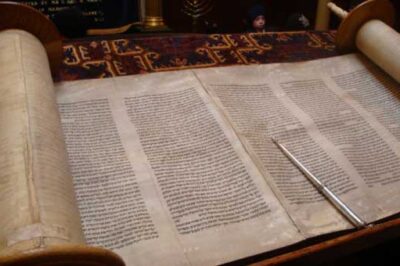“Are you telling me that as a Gentile believer, I don’t have to keep the Sabbath or eat Kosher in order to be saved?” That was the question a precious young believer asked me at the end of my message a few weeks ago.
I taught all week at Blue Mountain Christian Retreat through my book Identity Theft, taking a hard look at the early communities of first-century believers and how they lived.
This woman had been taught in a Messianic congregation—I don’t know where—that God calls Gentiles to keep the Torah, just as Jews. Before I go further, let me make two points:
1. I do believe Jewish believers are called to live a Jewish life according to Scripture as a matter of calling (Rom. 11:29).
2. I don’t believe this has any bearing whatsoever on our salvation, which is obtained solely through faith in Yeshua alone.
Having said that, there are some congregations that teach God’s perfect plan is for Gentiles also to keep Torah. While I do believe there is freedom for any believer to keep the entire Torah, it is not required. Let’s take a look at the Word of God.
1. The Jerusalem Council. The very first theological council convened over this very issue. In Acts 15, Messianic leaders that had been preaching the Good News to the Gentiles gathered together. The issue at hand: Do Gentiles have to convert to Judaism in order to be saved?
After hearing impassioned testimony from Shimon Kefa (Peter), Jacob (James) ruled:
“It is my judgment, therefore, that we should not make it difficult for the Gentiles who are turning to God. Instead we should write to them, telling them to abstain from food polluted by idols, from sexual immorality, from the meat of strangled animals and from blood. For the law of Moses has been preached in every city from the earliest times and is read in the synagogues on every Sabbath” (Acts 15:19-21, NIV).
Some have claimed that the last part—that “Moses … is read in the synagogues”—meant that the Gentiles could grow in their Jewishness over time. It is more likely that Jacob’s intention was to show the four things they were forbidden to do were universally immoral ways to worship the one true God and that the Torah would back that up.
1. The four prohibitions address how the former pagans, now believers, could worship. Obviously, they would adhere to other universal laws found in the Old Covenant (“Thou shalt not lie,” “Thou shalt not steal,” etc.), but in their liturgical life—how they worshipped—they had to forsake certain pagan practices, such as drinking blood or lying with temple prostitutes, as these were clearly universally immoral worship practices to both Jew and Gentile. The Torah, which was read weekly, would affirm this (v. 21).
Biblical scholar Richard Bauckham has argued that each of the four prohibitions can be found in Leviticus 18-19. He claims these practices are moral issues (even though the context is liturgical) and that they were abominations by which God cast the Canaanites out of the Land. Jacob is merely saying here in Acts, “Torah backs up this decision.”
2. God has called Israel to be a separate nation. Israel was chosen from among nations to be a light to the rest of the world (Ex. 19:5-6; Is. 42:6; Gen. 12:3). This calling is not voided by the New Covenant. Paul says, referring to natural Israel, “God’s gifts and his call are irrevocable” (Rom. 11:29). But nowhere does the New Covenant command Gentiles to live as Jews.
As the Jews embraced God’s Law, His anointing would attract the Gentiles: “May God be gracious to us and bless us, and make his face shine on us—so that your ways may be known on earth, your salvation among all nations” (Ps. 67:1-2).
3. Mark Paul’s words to Gentiles. When Gentiles were being taught they had to be circumcised in order to be saved, Paul blew a gasket! Paul, who taught us it is faith alone, through grace that we are saved (Eph. 2:8), could not have been clearer regarding the Gentiles being required to keep the law of Moses:
“You foolish Galatians! Who has bewitched you? Before your very eyes Yeshua the Messiah was clearly portrayed as crucified. I would like to learn just one thing from you: Did you receive the Spirit by the works of the law, or by believing what you heard? Are you so foolish? After beginning by means of the Spirit, are you now trying to finish by means of the flesh? … So again I ask, does God give you his Spirit and work miracles among you by the works of the law, or by your believing what you heard?” (Gal. 3:1-3, 5).
And then: “For all who rely on the works of the law are under a curse, as it is written: ‘Cursed is everyone who does not continue to do everything written in the Book of the Law.’ Clearly no one who relies on the law is justified before God, because ‘the righteous will live by faith’” (vv. 10-11).
While it is clear that the new believing communities sprouting up in Gentile nations were aware of the Jewish roots of the faith (1 Cor. 5:7), where does Paul or any other New Testament writer encourage Gentile believers to live as Jews?
Why, then, are Jewish believers commanded to keep the Torah?
Good question. First of all, let me repeat it: No one will be saved through works of the Law—Jew or Gentile. However, Jews are called to live as Jews as a matter of eternal calling (not to obtain eternal salvation). I can eat a lobster tail today, and it will not affect my salvation, but I would not be staying true to my calling as a Jew. In the Acts revival, the new Jewish believers were portrayed as being “zealous for the Torah” (Acts 21:20). And this was a good thing!
However, while Gentiles are certainly free to keep the Torah, it is not their calling. Gentile believers should not be made to feel guilty for not worshipping on Saturday or keeping kosher. They certainly can, but they are not compelled.
Robin Parry says it well: “Gentiles were granted the status of full membership of the end-time community of God’s people without having to convert to Judaism.”
One of the greatest examples of this in the New Covenant can be seen in the lives of Titus and Timothy. After coming to faith, Timothy, who was Jewish through his mother, was circumcised, whereas Titus, a Greek, was not: “Yet not even Titus, who was with me, was compelled to be circumcised” (Gal. 2:3). In fact, Paul circumcises Timothy just before going on a journey to tell the Gentiles they are not compelled to keep the whole Torah: “As they traveled from town to town, they delivered the decisions reached by the apostles and elders in Jerusalem for the people to obey” (Acts 16:4).
Imagine locking yourself in a room having never read the New Covenant. Then, without commentary from me or anyone else, you read the New Covenant. I am confident you would come away with these two New Covenant truths:
1. Jews who find the Jewish Messiah are still Jews.
2. Gentiles believers become one with Israel but are not required to live as Jews.
Ron Cantor is the director of Messiah’s Mandate International in Israel, a Messianic ministry dedicated to taking the message of Jesus from Israel to the ends of the earth (Acts 1:8). Cantor also travels internationally teaching on the Jewish roots of the New Testament. He serves on the pastoral team of Tiferet Yeshua, a Hebrew-speaking congregation in Tel Aviv. His newest book, Identity Theft, was released April 16. Follow him at @RonSCantor on Twitter.
For the original article, visit messiahsmandate.org.








Leave a Comment
You must be logged in to post a comment.